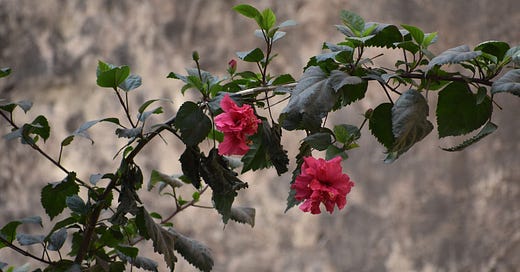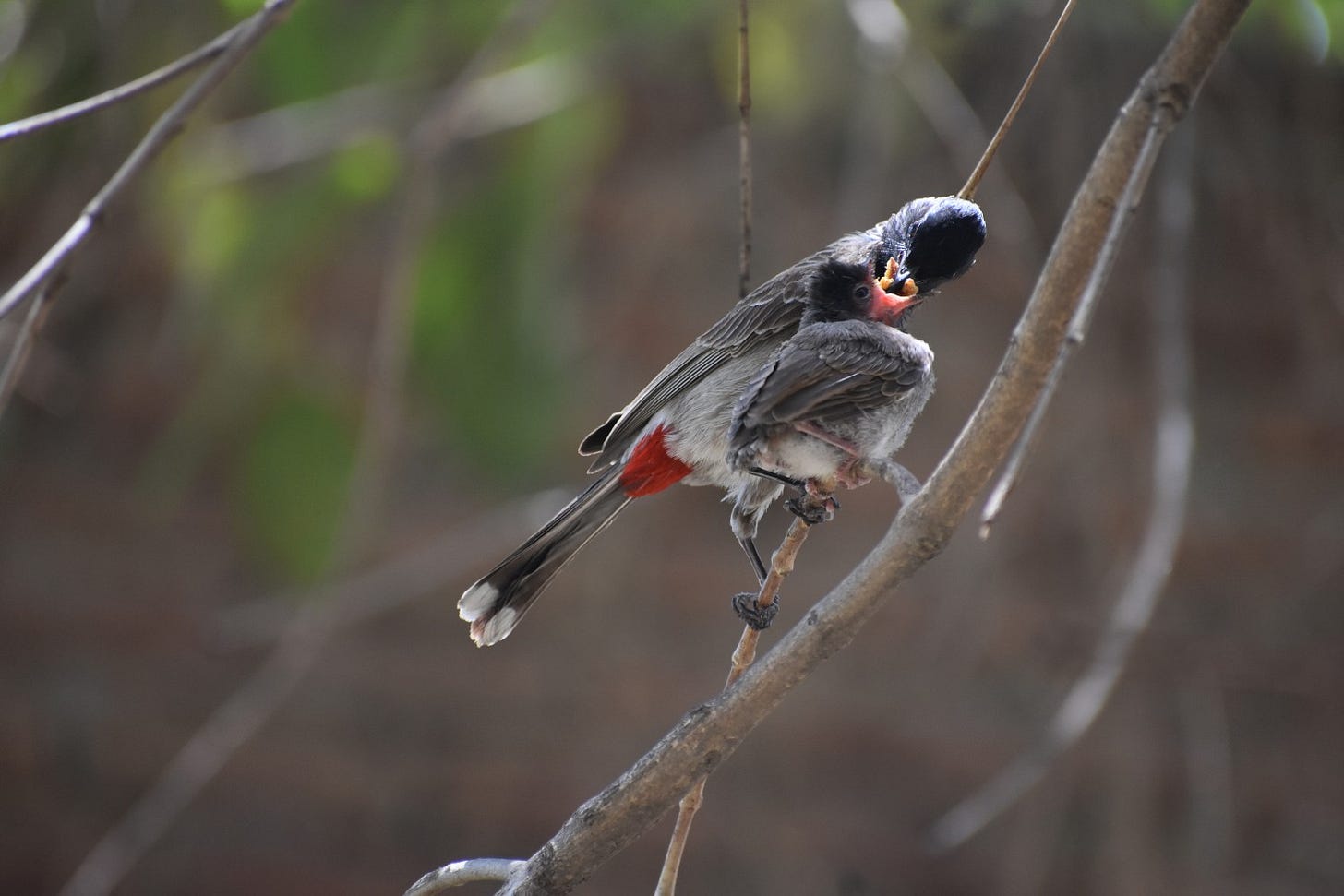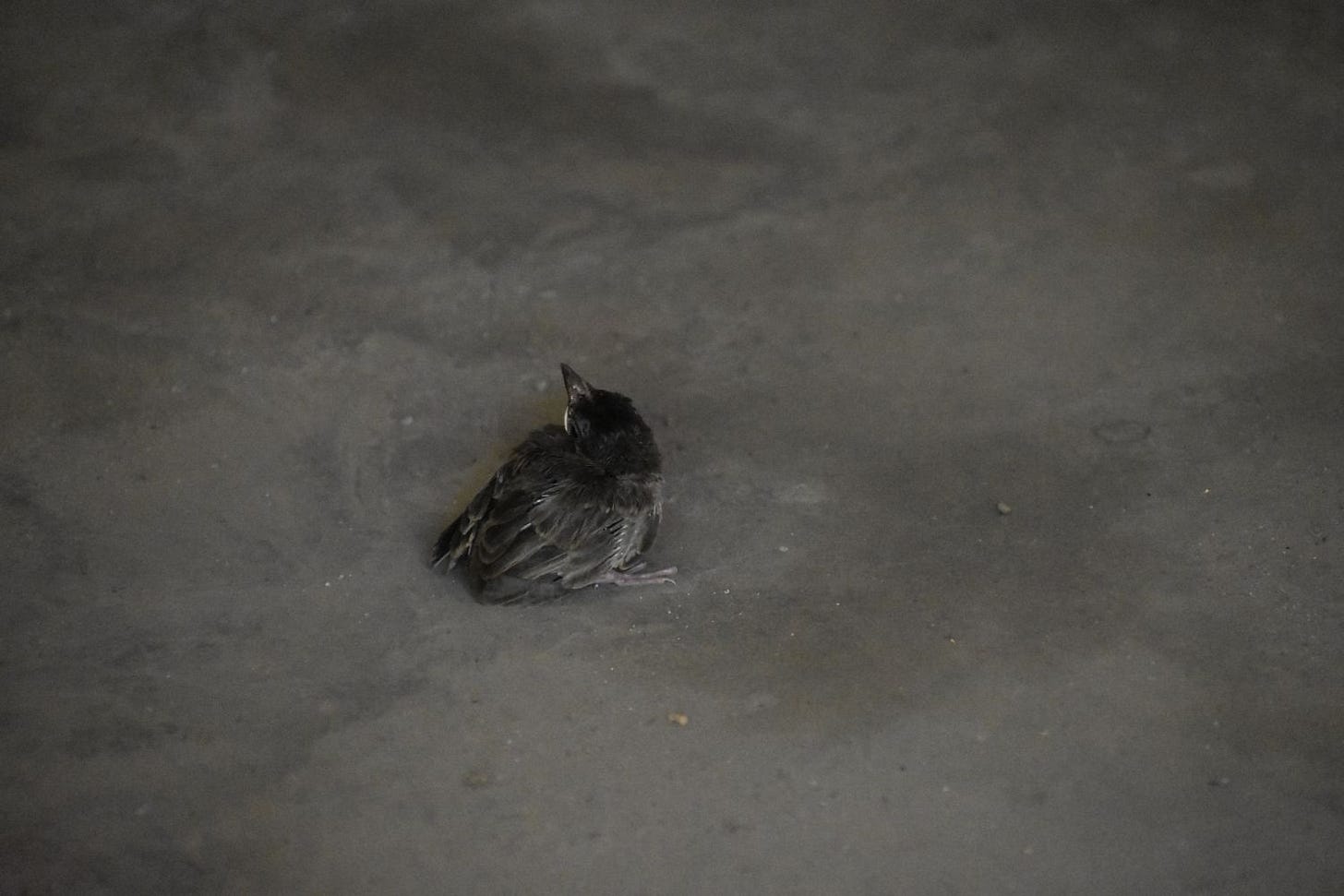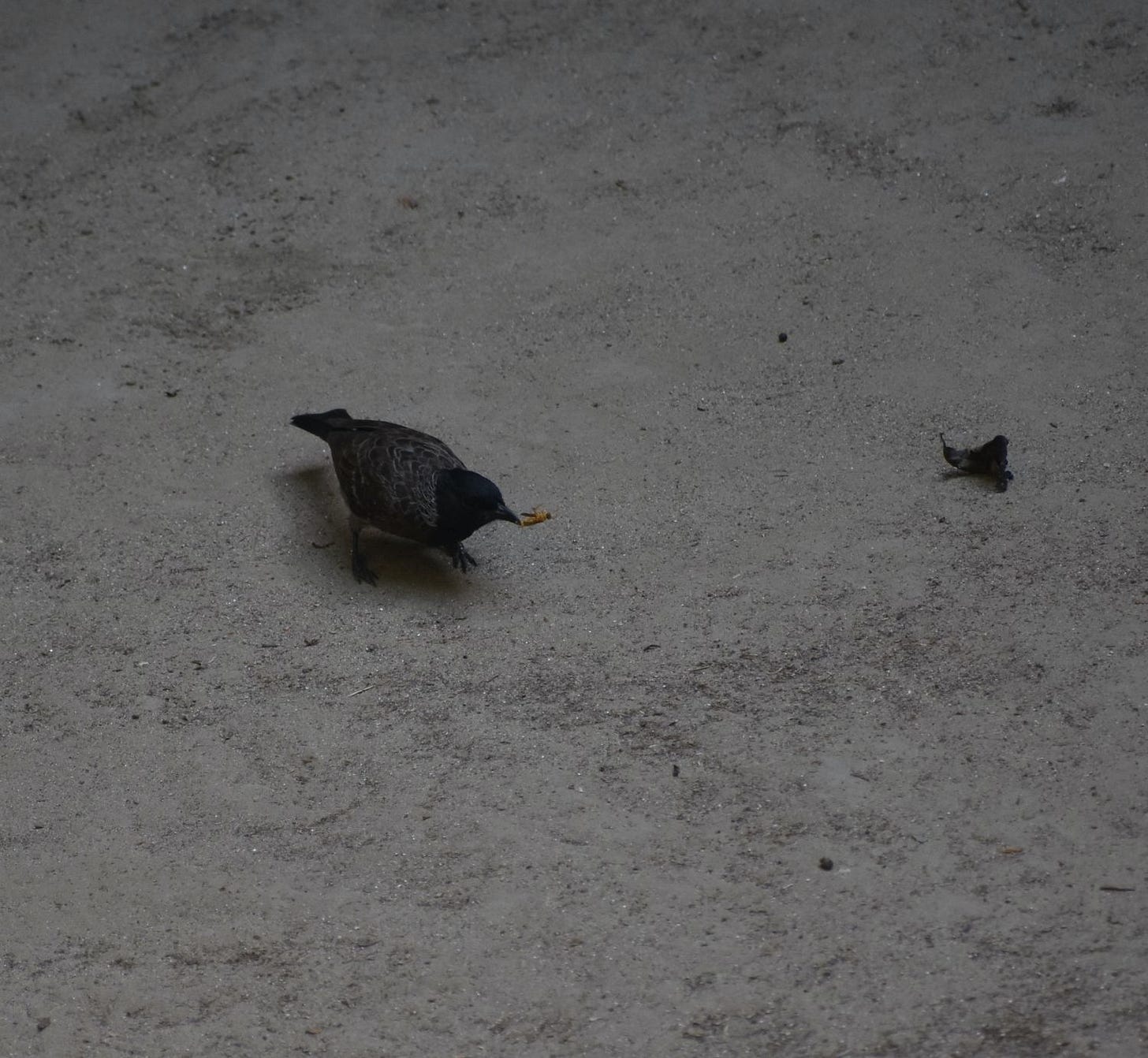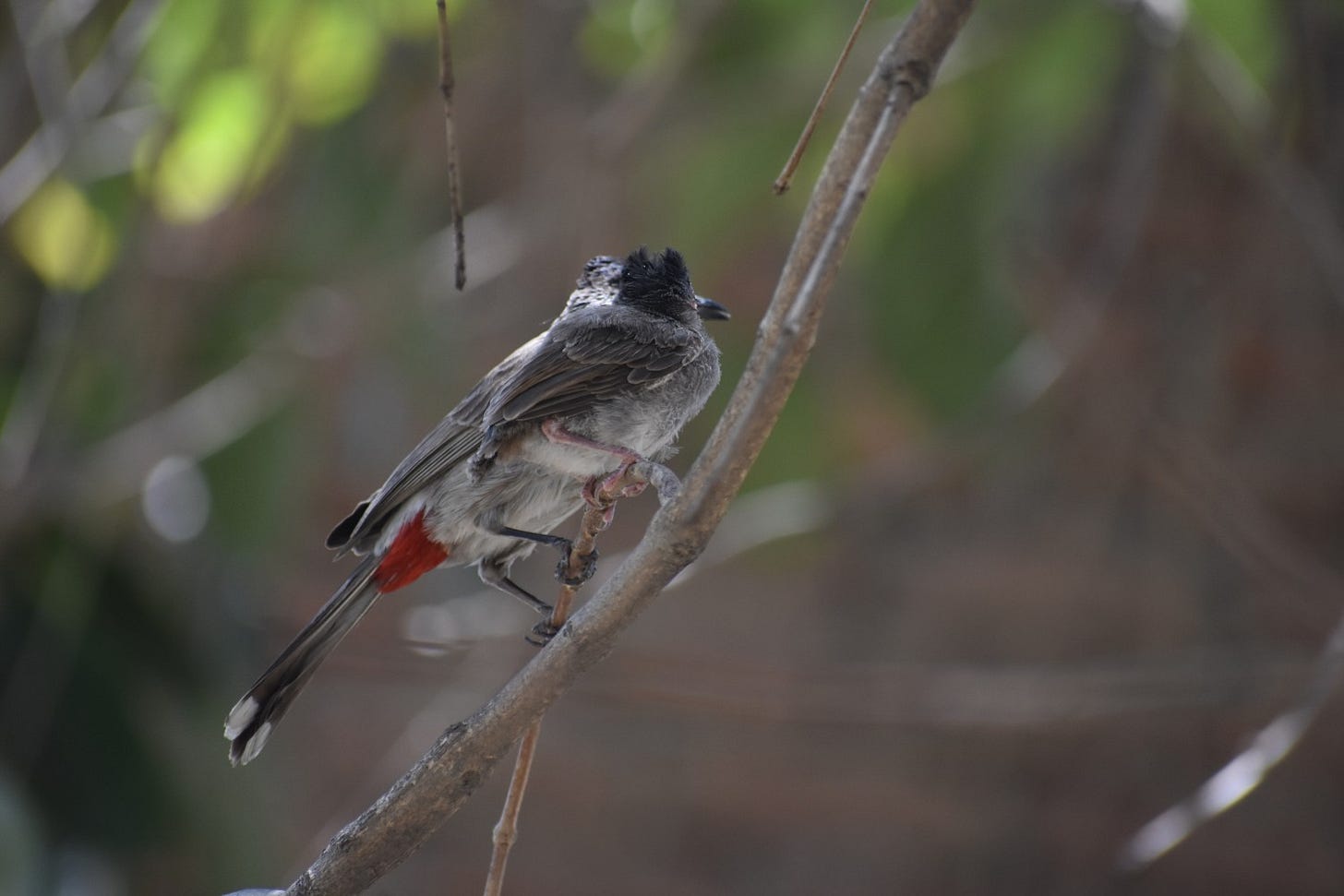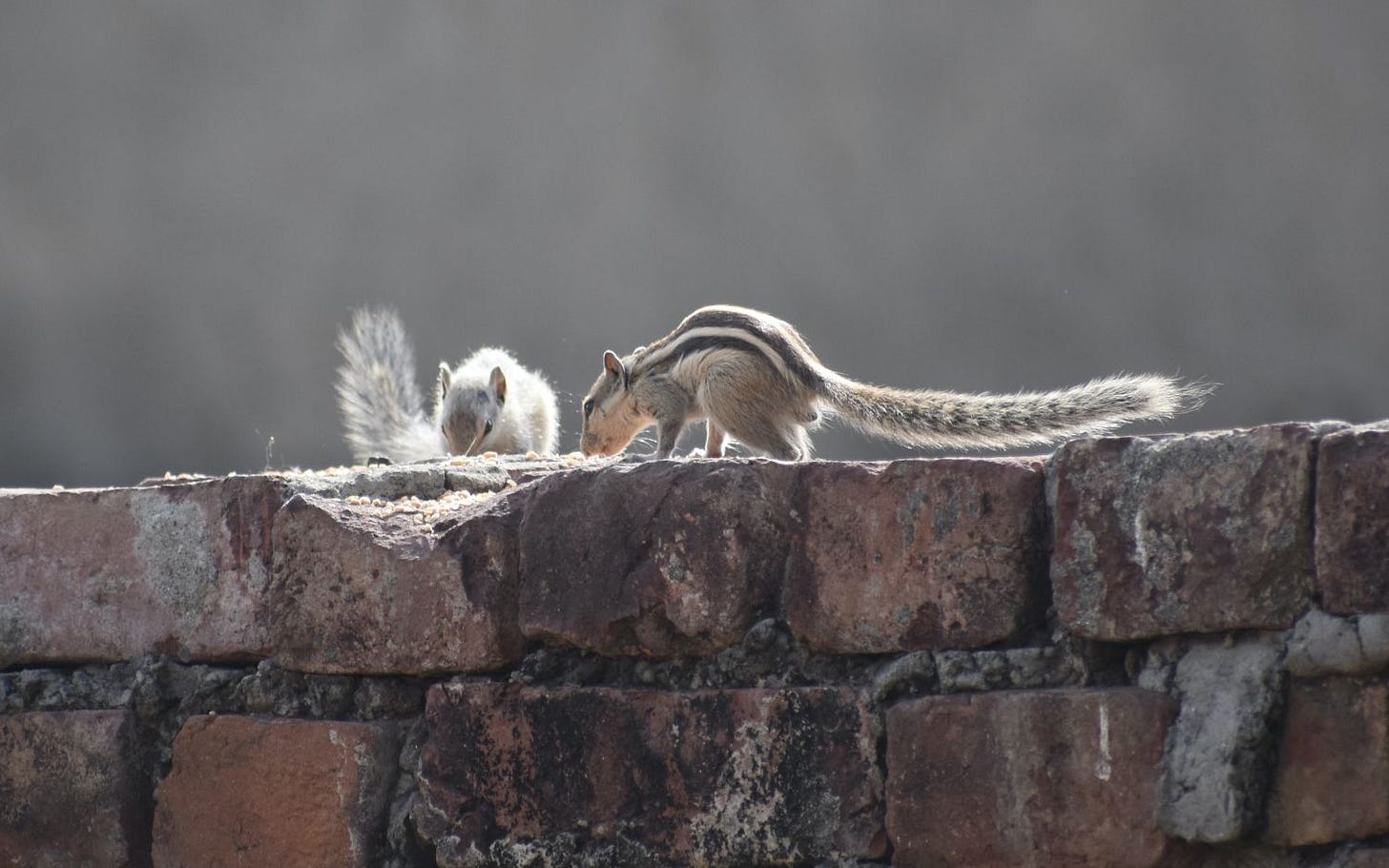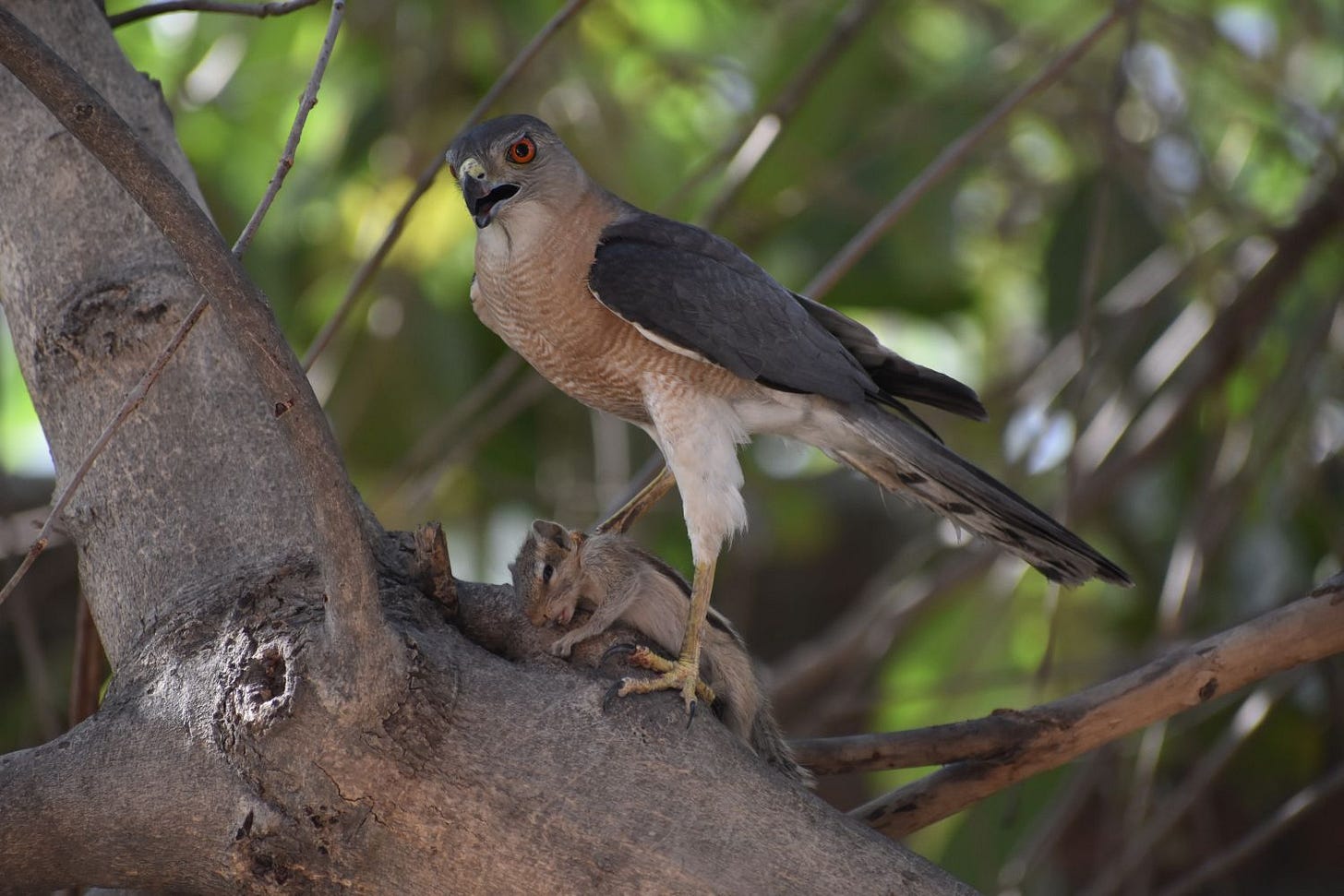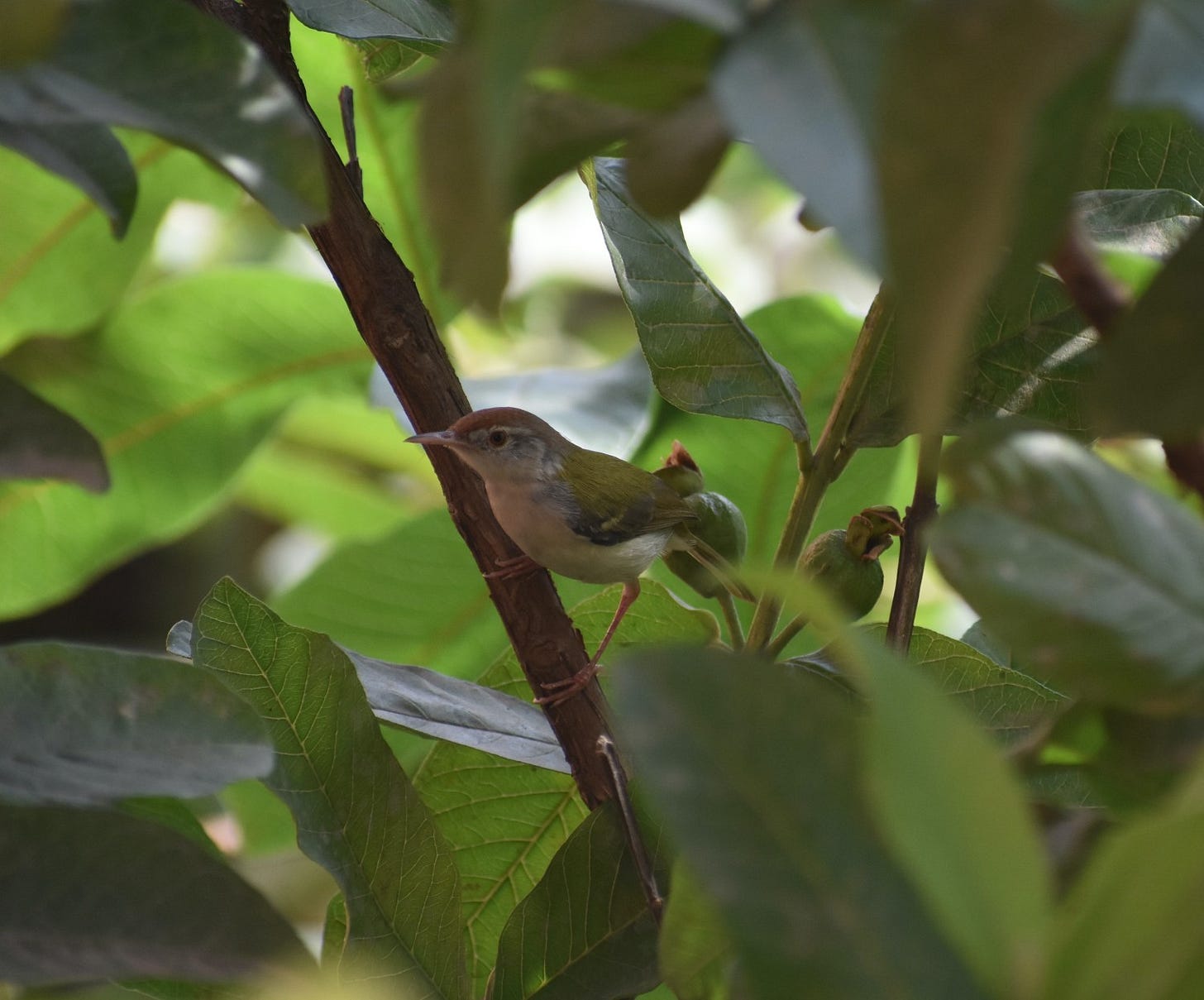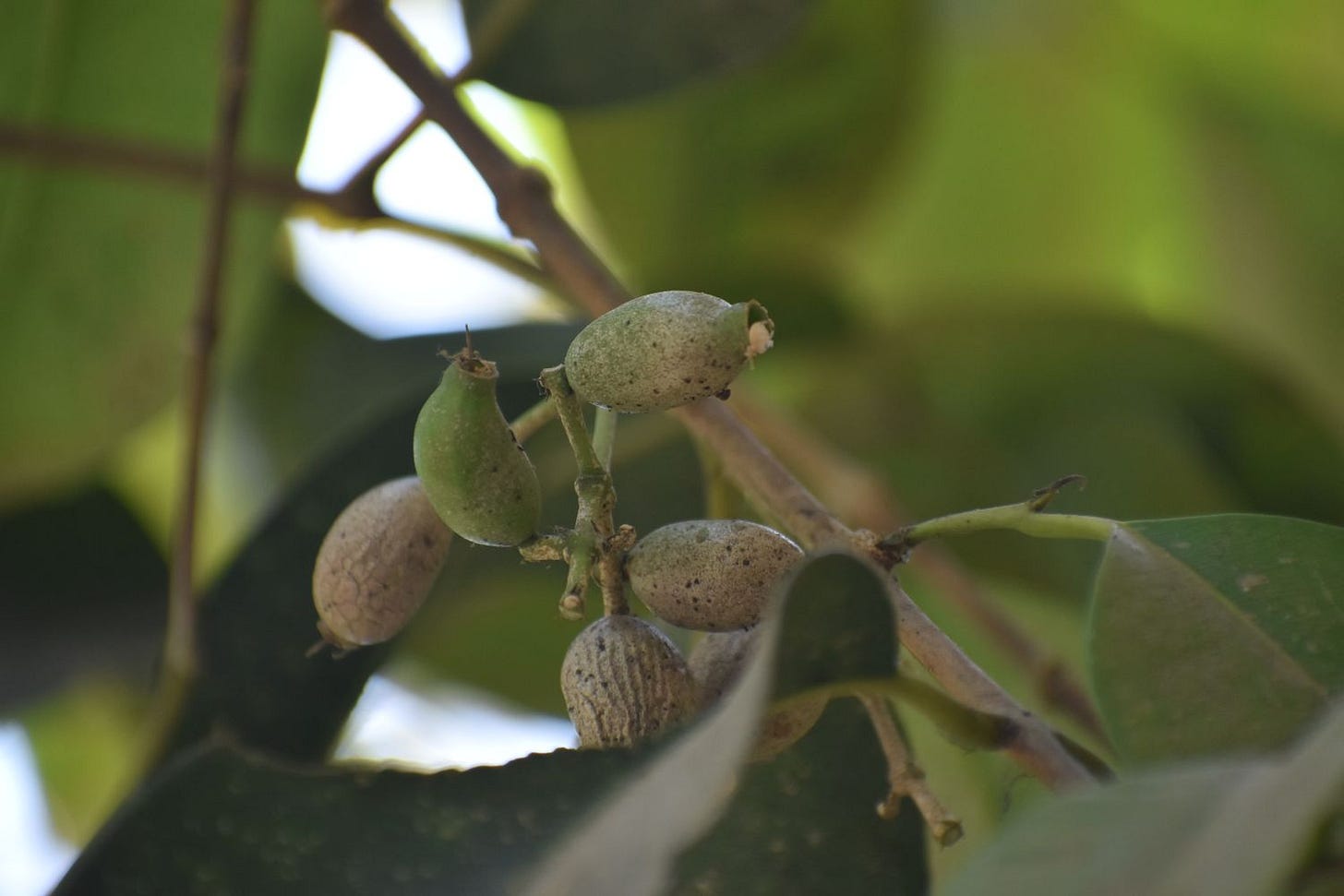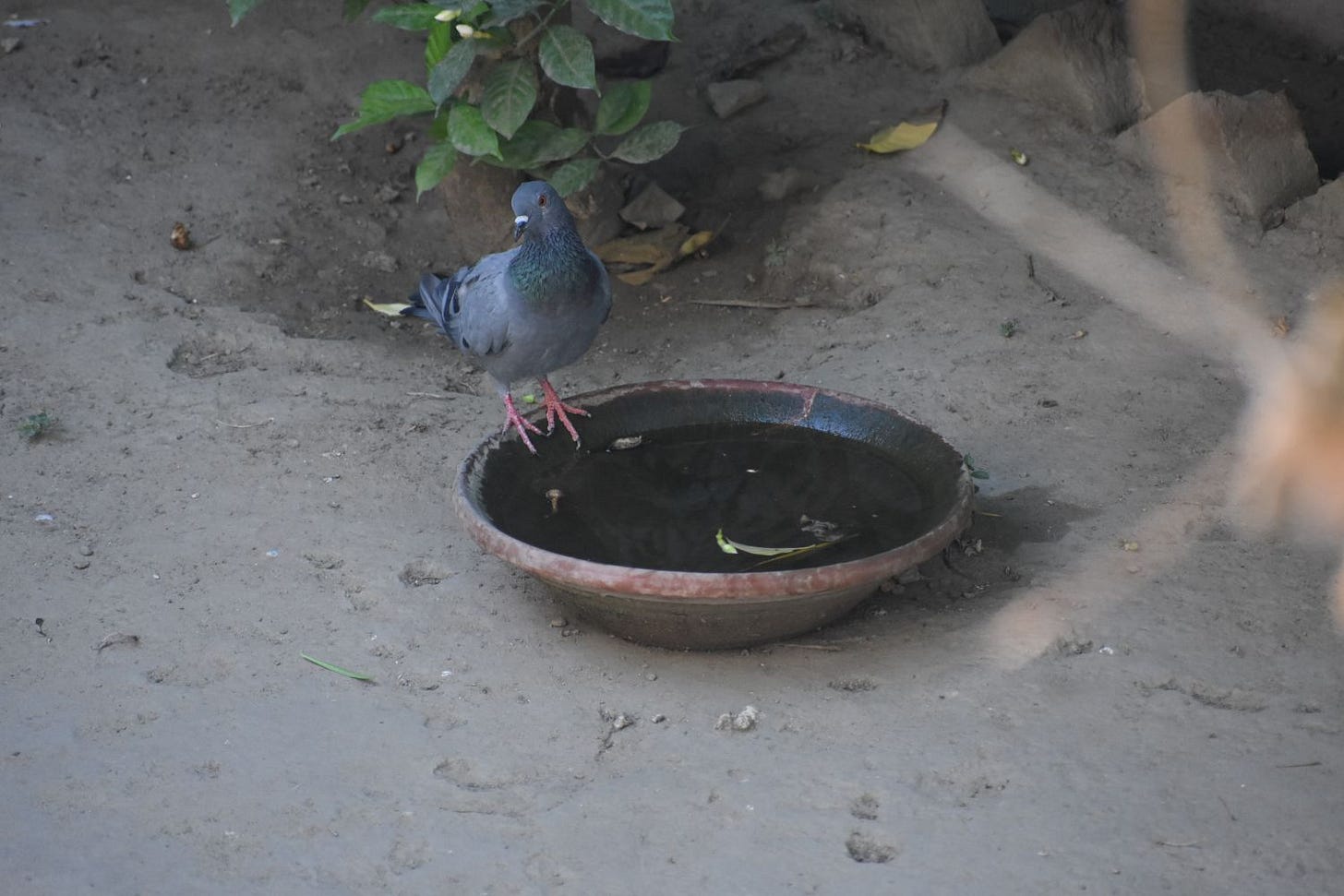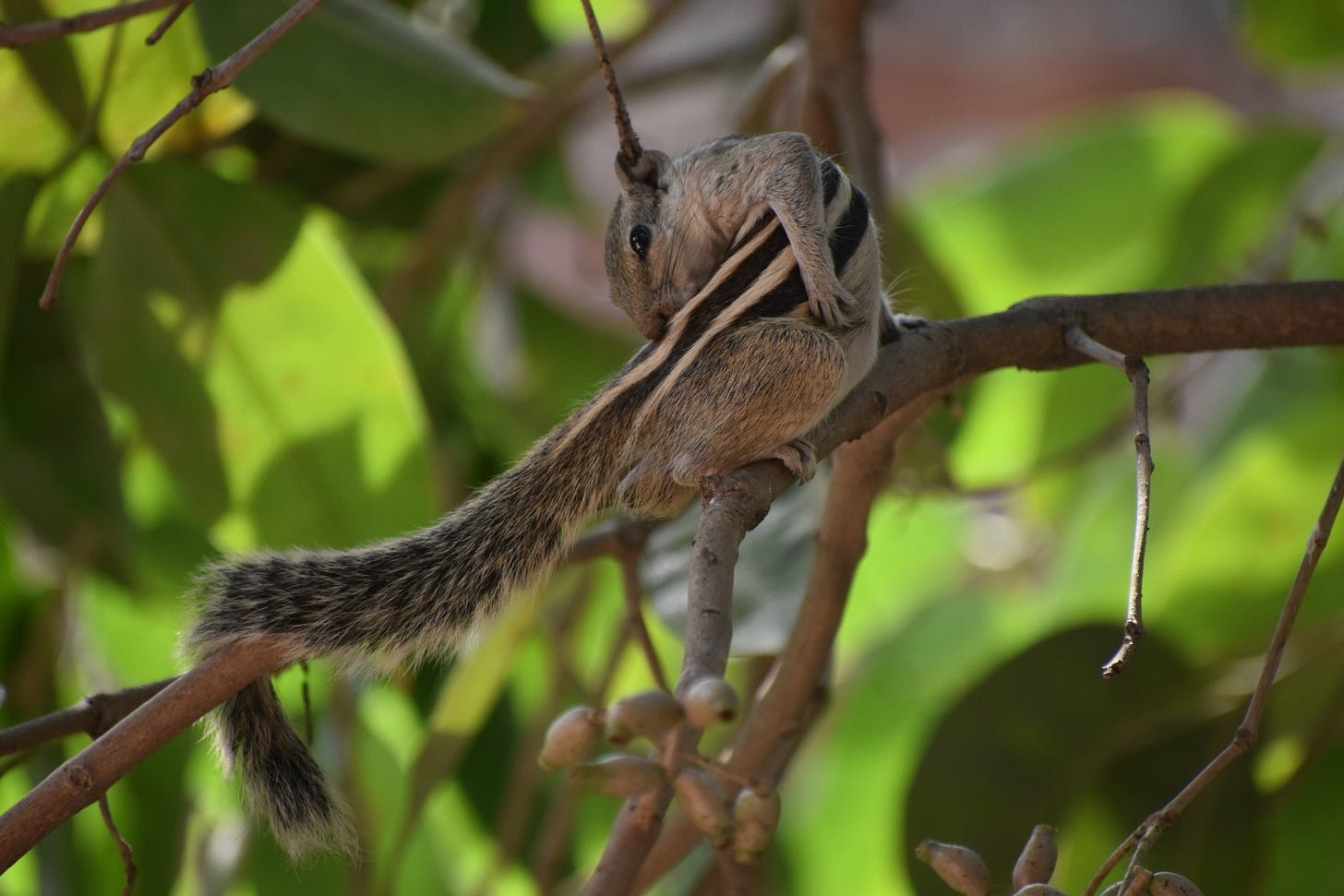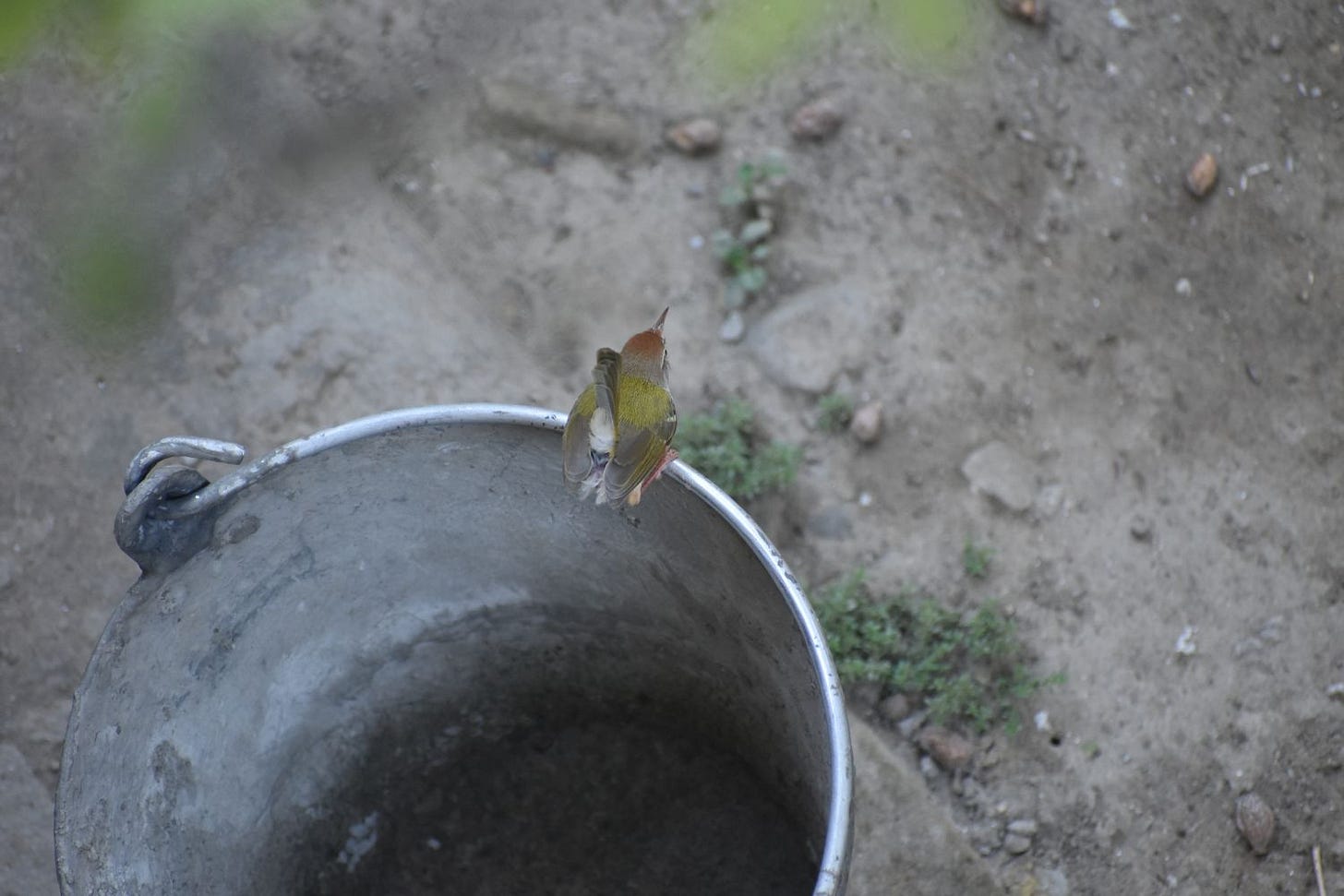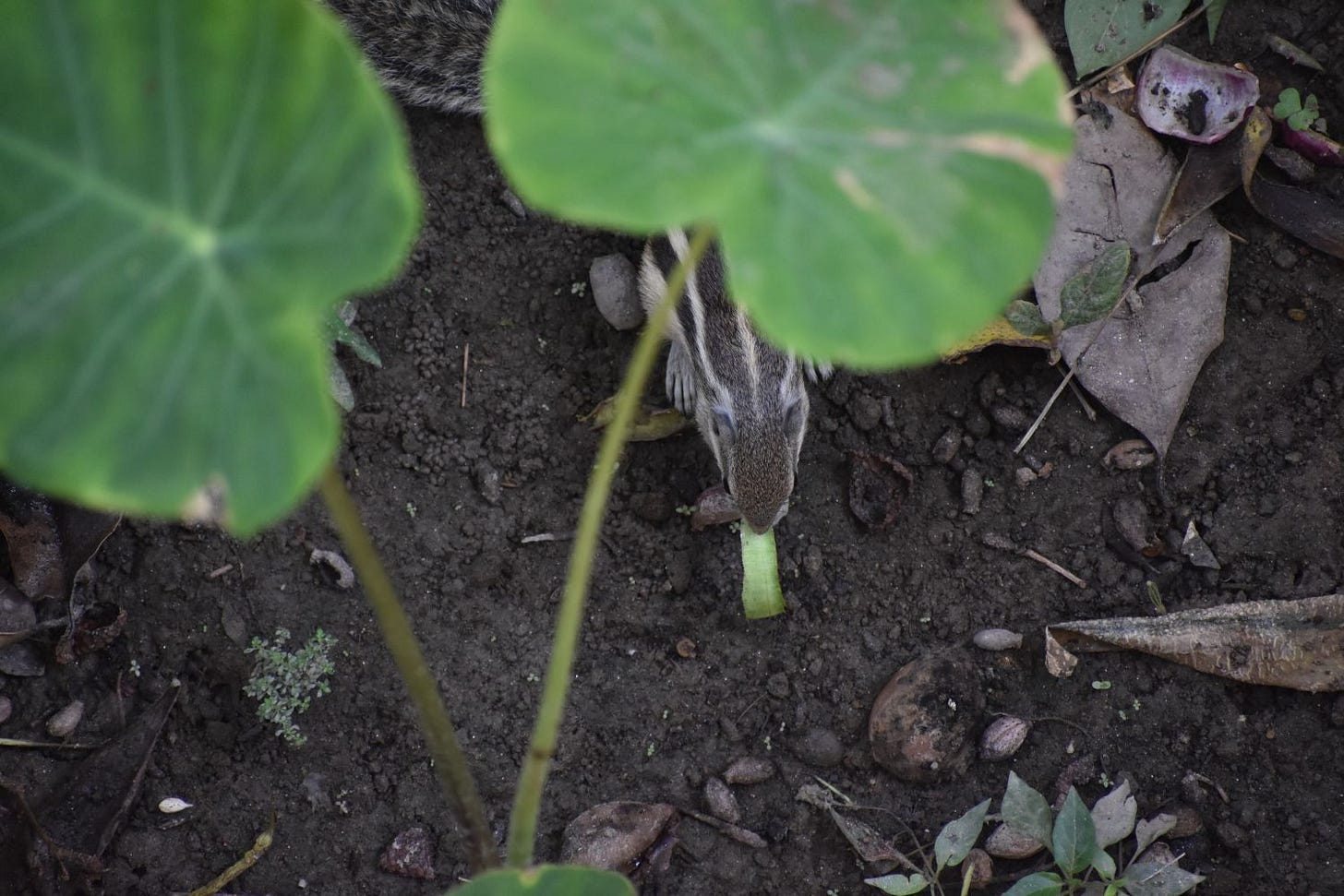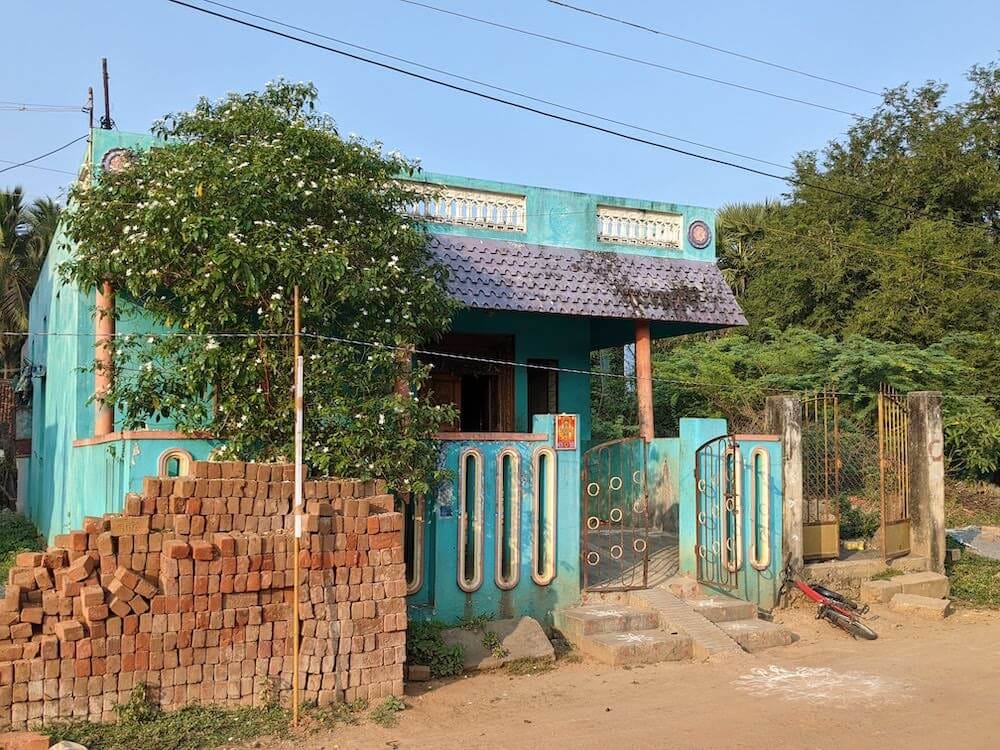against the force
lives around us, our little bit, grief is just love, walking, Arundhati Roy and Indian democracy, on wars and wildfires, and science of boredom.
Dear Reader,
Thank you for being here. I hope you’ve had a good start to the week.
I’m at my parent’s home in North India and have been here for more than two months, taking a break from the road and finishing a writing project. (My narrative on the three years my partner and I spent traveling around India in our car, without a home to go back to, is a good place to understand the joys and difficulties of an itinerant life.)
The heatwave is real. Temperatures are soaring to forty-seven degrees Celsius. I’ve not lived in such burning summers for decades, but I’m here now and trying to cope.
At these times when one doesn’t go out, my mother’s garden brings me solace. The bulbuls I shared with you in the last newsletter have had their children out. Out of three, one has survived and is learning to fly from one branch of the Indian blackberry to the guava—he has grown from an egg into a bird in less than three weeks. Unbelievable!
Another bulbul baby, tinier than this one, had jumped out of the nest along with this bigger one and was staying on the ground. When the last we checked, he was being fed by his mother; he even opened his beak promptly to accept food from my mother’s hand and took it in. But now he is missing.
My mother or I can’t find the little baby no matter how much we watch and stalk the parent bulbuls who are feeding mangoes and bees to the other one. If we go too close, the birds fly above our heads, shrieking and threatening to strike.
We fear that the gorgeous eagle who is feeding upon the freshly-out baby squirrels running in our garden has taken away the kid.
The circle of life!
The tailor bird I shared in the last newsletter, and share here again, has also made a fragile nest in a dry leaf of gourd vine. Yesterday, my mother sneaked down into the garden at 4 pm in the heat to see if there were eggs in the nest. There are.
In other news, many garden plants: jasmine, hibiscus, money plant, Indian blackberry, guava, mango, and Japanese plum have been burning in the heat. The leaves have turned yellow or brown and are crisp. Hibiscus buds have burnt and fallen off the tree without blooming. Tiny, little guavas are already yellow, scorched in the sun. The Indian blackberries are falling off the tree every day in kilos, some dried, some burnt, some with a little flesh which is already delicious. There were so many flowers on the tree my parents thought we would have a lot of blackberries, even without the bunches that hang on the neighbour’s roof and they pluck freely. Doesn’t look so now.
No amount of water is enough in the garden. How hard is the life of these little beings? We have our air conditioners, coolers, heaters, and all they have is the natural habitat, which is worsening now.
I’m happy to see that the two mud pots I kept in the garden and filled with water have regular visitors now. It’s a great feeling to know that just a few-minute task and a thought can bring relief to so many beings. The bulbuls, pigeons, doves, squirrels, eagles, crows, cuckoos, bees, and other birds all drink water from the two pots. Bulbul bathes in it now, dipping in to wet her wings, then shaking herself to shed off the water, dipping in again, and so on.
We may have destroyed our planet to a state of no return. But, even today, we can do so many things, little ones, especially little ones, that can provide home, comfort, and safety to the life around us.
I make sure there are no wires stuck in trees or in vines in which the birds might get entangled. We don’t disturb the ecosystem by meddling: so no shooing away the eagles though my mother fears they would capture all baby birds and baby squirrels. When I know one of the animals is stuck in a situation and can’t make it on her own, I ask my mother, and we both help them. And, in general, by making the environment friendlier and comfortable for the animals. Even if it means that I have to go down into the boiling garden every day and shower water on all plants so the tailor birds and bulbuls who come to bathe on the leaves or directly in the stream can continue their ritual and have a moment of relief in this heat.

This motley of life truly makes the world so beautiful. Without these lush trees and these mischievous animals and birds who scamper around all day, how boring it would all be!
What’s bringing you relief right now?
For this week’s letter,
Some of my writing,
quotes I love,
things to read,
things to watch,
and
travel tips.
Article from the Past,
A Definite Guide to Purposeful, Healthy, and Mindful Living
Everything I learned, researched, and practice for an aware, happy, and healthy life is in this one piece.
This’s the table of content in part,
Lessons on Longevity, Health, and Happiness – From Ikigai and Others
Hara Hachi Bu — Fill your belly to 80 percent — a Japanese principle that has blown my mind away.
About Two Meals a Day and Intermittent Fasting — One of the methods of eating less
Retiring early isn’t the best thing after all — An active mind is better than a lethargic one.
A feeling of belonging and togetherness is essential to keep us sane
Read the article now. Or Pocket it for later.
The Big Lessons a Little Family in Pondicherry Taught Me
The story of a small fish-eating, chicken-cuddling Pondicherry family that in its being taught me important lessons on love, peace, and their power.
Read the travelogue now. Or Pocket it for later.
Quotes I Love
“Grief, I’ve learned, is really just love. It’s all the love you want to give, but cannot. All that unspent love gathers up in the corners of your eyes, the lump in your throat, and in that hollow part of your chest. Grief is just love with no place to go.” ― Jamie Anderson
“Sometimes your next
halting step
is more powerful
than the grandest vision.All a leaf knows
about building a tree
is to turn towards the light.”
James Pearson
“It is not money that can procure for us that new vision of the world won through hardship.”
Antoine de Saint-Exupéry
“Now I feel more powerful when I speak less.”
Yours Truly
What I’ve Been Reading
I’ve been reading short stories, books, articles, and so much more. I can’t possibly list all what I have read in the past week so I’m putting down the things I found most relevant and worthwhile.
Why Walking Helps Us Think by Ferris Jabr
I love to walk. When I’m not deep into a project where I’m tied down from dawn to night, I get out and walk, or run. But running is exercise, not a way to see.
Walking is rejuvenating. Because I live from place to place, I often walk in new environments. Cities, villages, mountains, beaches, towns, gardens, forests. I might begin in the morning and walk until evening, stopping only to eat. It’s a joy I discovered during my first job in Bangalore when I started walking in the park to stay fit and reduce weight. My friends asked me—"Don’t you get bored walking for 45 mins every evening?” I was surprised. “No.” Why would I get bored?
The joy of walking really manifested itself on trips around India, to the UK, Southeast Asia, South America, and so on. If I had to see the place, I had to take myself around. Who would figure out bus routes or hire expensive taxis? I walked. Throughout the day, towards the night.
Since I started writing, walking has taken on a poetic meaning. Now I was not just walking to see, exercise, or commute. When I walked, my brain functioned in a magical way. It thought of things lying around, perhaps an issue with someone or a nagging discomfort, and resolved them. I got ideas. Ideas that never occurred to me sitting, exercising, or cooking. Ideas about the nature around me, ideas connecting different things to make a beautiful whole, ideas that relieved me from some worry, ideas that motivated me to let something go so I could move on, ideas that showed me the same old thing in a new perspective. Some of these ideas were so compelling I had to rush home to write them down.
I’ve to do a bigger post on walking, for it's such a core part of me and keeps me sane, brings me happiness, and floods creativity in my life.
Everyone should read this article.
“Walking at our own pace creates an unadulterated feedback loop between the rhythm of our bodies and our mental state that we cannot experience as easily when we’re jogging at the gym, steering a car, biking, or during any other kind of locomotion.”
“Walking on a regular basis also promotes new connections between brain cells, staves off the usual withering of brain tissue that comes with age, increases the volume of the hippocampus (a brain region crucial for memory), and elevates levels of molecules that both stimulate the growth of new neurons and transmit messages between them.”
A small but growing collection of studies suggests that spending time in green spaces—gardens, parks, forests—can rejuvenate the mental resources that man-made environments deplete.
The Algebra Of Infinite Justice by Arundhati Roy: What better time to share this than when Arundhati Roy: the spine of literature is being prosecuted for speaking the truth ten years back?
This article is old, written at the time of the September 11 attacks in the US. It says some of the obvious things, things I always thought about but never put down in words. I think everyone should read this article if they haven’t already. — For some reason, Twitter didn’t allow me to post this piece.
“The trouble is that once America goes off to war, it can't very well return without having fought one. If it doesn't find its enemy, for the sake of the enraged folks back home, it will have to manufacture one. Once war begins, it will develop a momentum, a logic and a justification of its own, and we'll lose sight of why it's being fought in the first place.”
“Terrorism as a phenomenon may never go away. But if it is to be contained, the first step is for America to at least acknowledge that it shares the planet with other nations, with other human beings, who, even if they are not on TV, have loves and griefs and stories and songs and sorrows and, for heaven's sake, rights.”
Arundhati Roy
Many Words for Heat, Many Words for Hate by Amitava Kumar—a beautiful, honest, and nostalgia-filling narrative by the author Amitava Kumar, speaking of his journey through Delhi, Patna, and Himachal Pradesh in 2022.
Kumar is talking about a post-covid India, when he visits from the US, attends author events and meets publishers in Delhi, and visits his old and sick father in his hometown in Patna. In the scorching temperatures in Delhi, he tries to understand both the heat and the hate under the current Modi government. He visits his father, another Modi fan, but refrains from speaking to him about his political inclinations. Kumar couldn’t get his son a visa to visit India. Kumar’s wife, and so the mother is a Pakistani, and the Indian Ministry of Home Affairs needed 4-6 weeks to do a security check. Why really? In Delhi, he meets Arundhati Roy who tells him at her home,
“In the 1960s, revolutionary movements in India talked about the redistribution of land and wealth. In the nineties, things had been reduced to campaigns against the displacement of the poor in places like Narmada Valley, during the construction of big dams. From redistribution to ‘Let us please hold on to what little we have.’ In the 2000s, it came down to the National Rural Employment Guarantee Act, which assured the poor one hundred days of unskilled manual work every year. Even that was considered by some to be unviable or unnecessary. Today, people were being forced either to fight for their very citizenship, or to rejoice at being given five kilos of flour and one bag of salt with Modi’s picture on the front. India was like a plane flying backwards with all its parts falling off.”
Everyone should read this piece. It considers the macro and micro of everyday life and the bigger picture of not only the biggest “democracy” in the world but of the world as a whole.
Sinking Town by Amitava Kumar—Real account of how the thoughtless construction of dams, tunnels, highways, railway lines, and their paraphernalia break the mountains, sink the earth, and demolish homes. The story is from Joshimath in Uttarakhand, but it could be from anywhere. I have seen this destruction myself and wrote about the devastating rains in the Himalayas in 2023 in this newsletter.
What is Hamas and why is it fighting with Israel in Gaza?—This article has all the facts and data in a straightforward manner, and I appreciated it. Sharing it here for those who get confused in the current, tragic state of affairs regarding Israel and Palestine.
Another heartbreaking article on the war, Gaza Strip in maps: How life has changed
“More than 1,200 Israelis and foreign nationals were killed during the Hamas attacks on 7 October. More than 31,000 Palestinians - including about 13,000 children - have been killed in Israeli airstrikes and operations since then, according to Gaza's Hamas-run health ministry.”
Indian Ocean headed for a near-permanent state of marine heat wave—Quite a scary article which tells that “The heat waves, that occur over the ocean, are likely to extend to 220-250 days a year by 2050, warns a new study.”
“These prolonged marine heat waves will not only intensify cyclones but also affect fish migration, coral reefs, phytoplanktons and marine biodiversity,” says Roxy Mathew Koll, scientist with Climate Research Lab, Indian Institute of Tropical Meteorology (IITM), Pune.
There are heatwaves in the US, Greece, and Mexico and wars and wildfires everywhere.
Is there any escape? Do we go to a beach town or mountain, stay in our country or leave it to travel to another nation? Everywhere is the same.
We can just try to do our bit by taking care of our own neighborhoods.
Ecuador’s president won’t give up on oil drilling in the Amazon. We plan to stop him – again by Nemonte Nenquimo: A brave story. Maybe we need something like this—the indigenous communities coming out of the deep forests to protest against oil drilling and selling the jungle—all over the world.
“Our wealth is the forest. Our wealth is alive. Our wealth is the knowledge we carry and share through song. Our wealth cannot be reduced to ones and zeros and flung across the globe. We’ve stopped the oil companies from stealing our future, and we’ll stop them again.”
Prairie Dogs by Benjamin Kunkel—What a heartbreaking, tragic, and entertaining story. I love reading short stories on the internet, and this one made me think about how imperfect are humans. We quickly point fingers at others because it’s the easiest thing to do.
Boredom marks the space where hope is buried by Nuar Alsadir— an interesting, mind-opening article on what boredom means, the harmful affects of ignoring it, and how we can relieve ourselves from boredom. A must-read.
“Boredom expresses the state of tension between a fear, desire or impulse that has been repressed and the leftover yearning that remains free-floating in consciousness, looking to attach to something. It is always easier to project that search into the external world than to look internally. But the external search can only fail. ‘The person who is bored,’ the psychoanalyst Otto Fenichel writes, ‘can be therefore compared to one who has forgotten a name and inquires about it from others.’”
“Boredom that isn’t resolved internally frequently causes the bored person to compulsively search outside of themselves for relief. This often leads to overactivity that psychoanalysts term ‘manic defenses’ – scrolling, swiping, substance abuse, constant socializing, actions that clutter out negative emotions that might otherwise have had the space to consciously register.”
To get a break from reading, photographs from the world: Eid al-Adha and Pride: photos of the weekend
What I’ve Been Watching/Listening
that’s worth mentioning
I have watched a movie or two but nothing so impressionable. Next time.
And for all adventure lovers!
two more photos for today.
Thank you for reading!
If you loved the newsletter, please forward it to someone you know. Help me reach more people. They can sign up for free here.
I hope you get to eat a lot of mangoes, or whatever is the king of fruits around you :-)
Let me know what you think about this letter. Press reply.
Yours,
Priyanka
Some housekeeping… This email may end up up in the Promotions tab of your inbox. If you don’t find the newsletter during the week, go to your Promotion tab and move this email to your Primary inbox. Looking Inwards letter will be in your inbox every week from then on.

